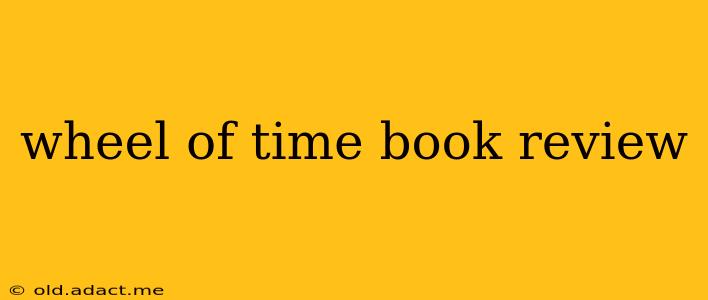Robert Jordan's The Wheel of Time is not just a fantasy series; it's a monumental undertaking, a sprawling epic that spans fourteen books (plus a prequel and a companion book) and countless characters. For those unfamiliar, it's a high fantasy saga set in a world recovering from a devastating age of darkness, where magic is wielded by women, and the fate of the world rests on the shoulders of a seemingly ordinary farm boy. This review aims to provide a comprehensive overview, touching on its strengths, weaknesses, and overall impact on the fantasy genre.
What Makes The Wheel of Time So Enduring?
The series' enduring appeal lies in several key aspects:
-
World-Building: Jordan's world, Randland, is richly detailed and expansive. From the arid deserts of Aridhol to the snow-capped mountains of the Dragonmount, each region possesses a distinct culture, history, and magic system. This intricate world-building, while sometimes overwhelming in its detail, is a cornerstone of the series' success. It's a world that feels lived-in, believable, and consistently fascinating to explore.
-
Complex Characters: The Wheel of Time boasts a vast cast of characters, each with their own motivations, strengths, and flaws. While some may criticize the sheer number of characters, this depth allows for nuanced relationships and unpredictable plotlines. The main characters undergo significant growth and change throughout the series, making their journeys compelling and relatable.
-
Intricate Plot: The overarching plot is both ambitious and intricately woven. The prophecies, the looming threat of the Dark One, and the intertwined destinies of the characters keep readers engaged, even when individual plotlines may meander. The sheer scope of the story is breathtaking.
-
Magic System: The magic system, called saidin and saidar (for men and women respectively), is intricate and well-defined. It's not simply waving a wand; it requires skill, discipline, and a deep understanding of the One Power. This adds a layer of complexity and realism to the fantasy elements.
Addressing Common Criticisms
Despite its many merits, The Wheel of Time isn't without its detractors. Some common criticisms include:
-
Pacing: The series is undeniably lengthy, and the pacing can feel slow at times, particularly in the middle books. Many plot threads are introduced and then seemingly forgotten for extended periods, which can test the patience of even the most dedicated reader.
-
Repetitive Elements: Certain plot devices and character tropes reappear throughout the series, potentially leading to a sense of repetition. This is often attributed to the sheer length and the author's struggles towards the end of the series.
-
Female Character Development (Early Books): While later books offer more depth to female characters, some argue that the early books fall short in this area, portraying some female characters in a way that feels stereotypical.
Frequently Asked Questions (PAAs)
Is The Wheel of Time worth reading?
Whether or not The Wheel of Time is worth reading depends entirely on your preferences. If you enjoy complex, sprawling epic fantasy with a richly detailed world and numerous characters, then it's likely you'll be captivated. However, if you prefer faster-paced narratives with fewer characters and less intricate plotlines, you might find it challenging.
How many books are in The Wheel of Time?
The main series consists of 14 books. There is also a prequel novel, New Spring, and a companion book, The World of Robert Jordan's Wheel of Time.
Is there a particular order to read the books?
Yes, you should read the books in chronological order. Starting with The Eye of the World is crucial to understanding the overall narrative.
Is it okay to start reading The Wheel of Time in 2023?
Absolutely! The series continues to hold its own and remains a highly influential work of fantasy literature. Despite its age, the core elements remain incredibly engaging, and it's a great time to experience this epic tale.
Conclusion
The Wheel of Time is a monumental achievement in fantasy literature. Its intricate world-building, complex characters, and ambitious plotline create an unforgettable reading experience. While some criticisms are valid, the series' strengths significantly outweigh its weaknesses. For those willing to commit to the journey, it offers a richly rewarding and unforgettable escape into a world of magic, adventure, and destiny. The impact of this series on the fantasy genre is undeniable, making it a must-read for any serious fantasy fan.
